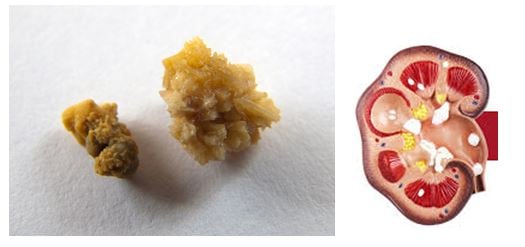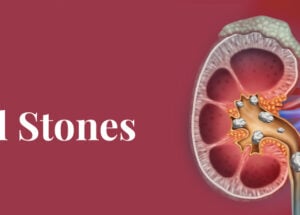Kidney Stones
Kidney stones in the urinary tract are common, between 8-15% of people will get a kidney stone in their lifetime. They can occur at any point along the urinary tract, but they are most commonly found in the kidney, ureter and bladder. Ureteric stones are discussed differently under ureteric stones.
Stones are formed in the kidney. From the kidney they may gradually grow and then move from the kidney into the ureter (pipe connecting the kidney to the bladder).
Once someone has had a kidney stone there is a 50% chance they will form a further stone within five-ten years.
How do kidney stones form?
The kidneys’ function is to filter the blood and remove unwanted chemicals. These chemicals are passed out in the urine, and some are able to form crystals. The crystals grow to become stones. Crystals, and indeed stones, form more readily when the urine is very concentrated (golden in colour).
Types of stones
The main composition of stones is calcium oxalate. Sometimes uric acid stones or phosphate stones form and very rarely cystine stones form.
Symptoms of kidney stones
Small stones in the kidney may give rise to no symptoms at all. However, kidney stones may grow up to several centimetres in size and give rise most commonly to pain, recurrent urine infections and blood in the urine.
Diagnosing kidney stones
The diagnosis of stones is normally made based on the symptoms outlined above. To confirm the presence of a kidney stone, urine is taken to look for blood and to exclude a urine infection. We will usually arrange a CT scan. This will identify the site and size of the stone, which dictates how the kidney stone is then treated.

Investigating kidney stone formers
Most patients if they have a single stone episode only require a simple blood test to check the calciumandurate in the blood. However, if the stones have come back, there is more than one stone, there is a family history of stone formation or an underlying medical condition that predisposes to stone formation, then a more extensive investigation called a 24-hour metabolic stone screen will be arranged. This involves collecting urine over a 24-hour period and then the chemicals within the urine can be measured to see if there is an underlying cause for the stone formation.
Kidney Stone Treatment
Medical Treatment for Kidney Stone
Only uric acid stones can be treated with oral medications to dissolve it. There are no oral medicines to dissolve calcium oxalate stones.
Surgical Treatment for Kidney Stone
The main kidney stone treatment options are Flexible ureteroscopy and laser stone fragmentation, ESWL and PCNL/Mini PCNL for stones in the kidney. The urologist will determine which is the right kidney stone treatment for you based on the size, position and likely composition of the stone
Urology Hospital near me | Urology Doctor near me | Urologist near me








